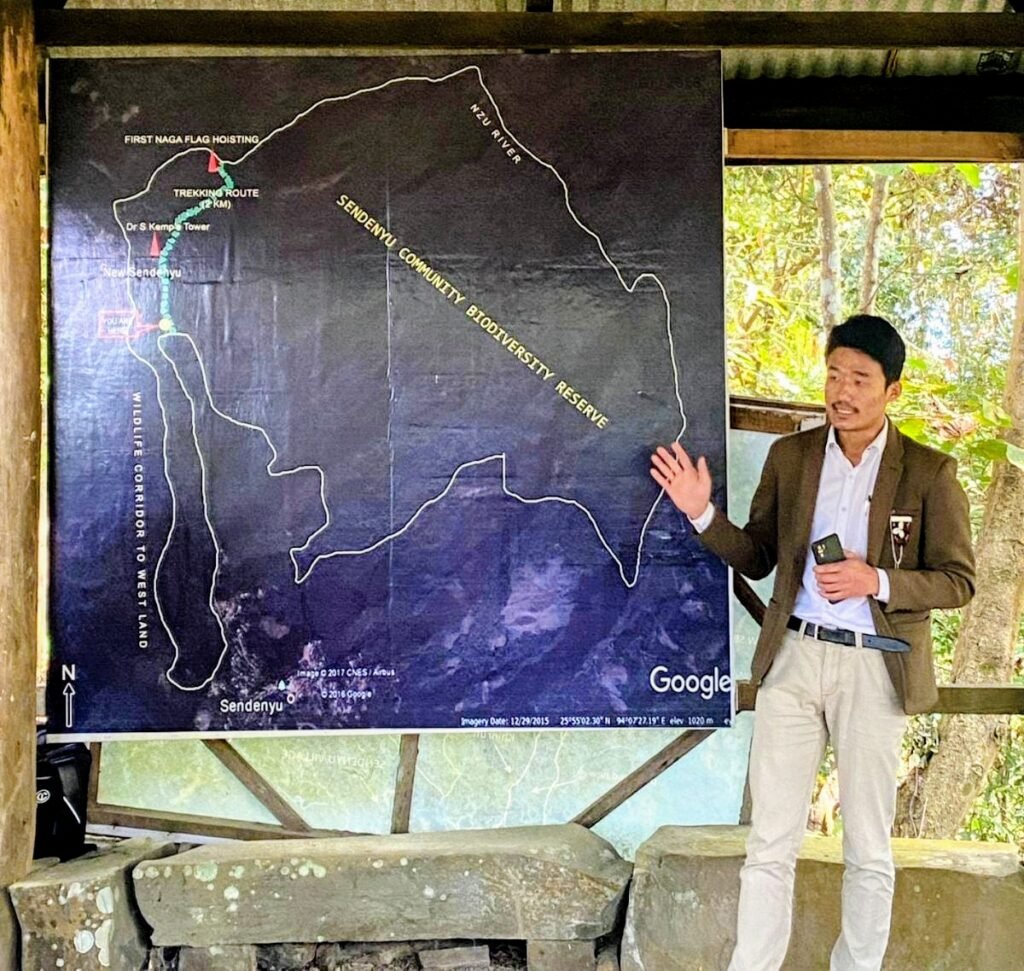Kenono Foundation is a community-led organization working in Nagaland under the leadership of Ruchinilo Kemp for holistic community development – Empowering Communities and Conserving Biodiversity.
Welcome to this special edition of India CSR Interview, where we meet inspiring leaders making a tangible difference in the world. Today, we are deeply honored to have on our platform, YFI alumnus, Ruchinilo Kemp. He is the dynamic founder of the Kenono Foundation, an organization dedicated to the holistic community development of forest-dependent communities in Nagaland and surrounding regions.
Through the Foundation’s tireless efforts, they have been able to strengthen community conservation work and develop sustainable conservation enterprises, thereby supporting and conserving the region’s unique biodiversity. Their noble mission has touched over 1600 families, which include a tribal community native to the region, creating a lasting impact.
Ruchinilo Kemp‘s vision and innovation truly embody the spirit of youth-led grassroots solutions, aimed at fulfilling our country’s social development goals. Join us for this enlightening conversation.
Q1. Could you share some insights about the work and mission of the Kenono Foundation?
Kenono Foundation is a community-led organization in Nagaland to usher in a vision of collective ownership and responsibility for holistic community development of forest-dependent communities in Nagaland and surrounding areas. Its key programmatic area is strengthening the capacities of the local communities for biodiversity and developing ‘conservation enterprise’ models to support local conservation and create precedence for scalability and policy.
Q2. Could you elaborate on the various initiatives that the Kenono Foundation is involved in?
Kenono Foundation’s work revolves around three themes- Community Biodiversity Conservation, Conservation Enterprises, and Cooperatives viz. Zunpha MPCS Ltd. Based on these themes its projects include-
- Community Biodiversity Conservation,
- Sustainable REDD+ Carbon Credit,
- Responsible Community Ecotourism,
- Business Development for cooperatives viz. Zunpha MPCS Ltd.,
- Value Chain Development of Arabica Coffee in Tseminyu District
Q3. Could you explain your strategy for comprehensive community growth and development?
To achieve holistic community development, the Kenono Foundation follows a two-step approach.
- Developing a set of pathways for enhancing conservation and livelihoods in community conserved areas (CCAs).
- Elevating the role of Community Conservation in the policy space both at the state and national levels.
Q4. Could you share what inspired or motivated you to focus on forest conservation?
Community conservation through grassroots work and policy formulation in the state viz. biodiversity conservation, wildlife protection and climate change adaptation has been on the surge in the past two decades. Likewise, it has been a period for the people to collaboratively embark on a path to build foundations of a community development model that incorporates the preservation of its rich natural biodiversity and its heritage with the changing needs of the community viz. economically and culturally.
However, the scope for conservation is enormous and unparalleled. It comes with its own challenges which threaten the rapid loss of biodiversity and fragmentation of community-based conservation in the state.
As per the Indian State of Forest Report 2017, the state has shown a decrease in forest cover (450 sq km). In spite of growing pressure on forests and natural resources, Nagaland has still maintained its forest cover at 75.33% which is much higher than the minimum of 66% as envisaged in the National Forest Policy of 1988. However, deforestation, degradation of forest resources, change in land-use patterns, hunting and illegal trade of wild flora and fauna are the major challenges that threaten the fragile ecosystems in the state.
All the above factors prompted me to work towards empowering the local communities with Community Conservation exercises.
Q5. Could you explain how you’re contributing to the promotion and support of the coffee industry in the northeast?
Kenono Foundation seeks to support the coffee venture in the Northeast, particularly in Nagaland, in terms of –
Providing training and capacity building on harvesting and processing of coffee beans,
market linkage to farmer cooperatives and groups for the sale of sundried Arabica coffee, and
branding and promotion of locally grown coffee.
Currently, Kenono Foundation is working in the Tseminyu district in Nagaland with Zunpha Multipurpose Cooperative Society Ltd. which works with coffee grower clubs and growers in the region to test the quality of locally grown Arabica coffee in partnership with Bluetokai Coffee and D Cafe Kohima in order to develop better market linkages for coffee growers in the region.
Q6. Could you shed light on the initiatives Kenono Foundation is taking to boost ecotourism and biodiversity conservation in the region?
Kenono Foundation is promoting ecotourism and biodiversity conservation in the region in several ways:
Conservation and preservation: The Kenono Foundation works towards preserving Nagaland’s natural resources, including its forests, wildlife, and biodiversity. This involves promoting sustainable practices, supporting conservation efforts, and raising awareness about the importance of protecting the environment.
Community involvement: Engaging local communities is crucial in promoting ecotourism. The foundation is collaborating with local communities to develop tourism initiatives that are led by and beneficial to them. This includes providing training, capacity building, and creating opportunities for local people to actively participate in and benefit from ecotourism activities.
Cultural preservation: Nagaland is known for its rich cultural heritage. Promoting ecotourism can involve highlighting and preserving the indigenous cultures and traditions of the region. The foundation supports initiatives that promote cultural exchange, traditional craftsmanship, local festivals, and cultural tourism experiences alongside nature-based activities.
Infrastructure and facilities: Developing sustainable infrastructure and facilities is important for ecotourism. The foundation may work on improving basic amenities, accommodation options, transportation, and waste management systems to ensure that tourism activities have minimal impact on the environment and local communities.
Awareness and education: The Kenono Foundation has undertaken awareness campaigns and educational programs to promote responsible tourism practices among visitors, locals, and stakeholders. This includes sharing information about the importance of conservation, sustainable tourism practices, and responsible behaviour while visiting natural and cultural sites in Nagaland.
With this Foundation we have been able to create an impact till May 2023 in two districts Tseminyu & Karbi Anlong in Nagaland & Assam. It has 1,600 families with 9800 people, it also covers 6,000 hectares of forest area and tribal communities.

Q7. Could you share the motivation or inspiration behind your decision to undertake this role and contribute to the social development sector in Nagaland?
During my stint as an SBI Youth for India Fellow, working in rural communities was a turning point in my life. Once I engaged with the communities, I realized that this was my true calling and I had to utilize my education and capabilities to help the community. The Fellowship prepared me to feel the pulse of the community and the marginalized section of our society which kept me grounded in my journey as a conservationist and social entrepreneur. With Kenono Foundation, I now plan to step further and work on community engagements with various projects and make a sustainable impact on rural people and their livelihood and biodiversity conservation.
Besides, I have a deep-rooted passion to engage with social and environmental issues and aspire to make a positive impact on my community. I have witnessed the challenges faced by people in Nagaland and feel a strong desire to contribute to their well-being and development as a youth from the region. I was very blessed to have grown up in a loving and caring family environment, and having experienced that love and care drives me to help others and work towards creating a more compassionate and caring society.
In my view, the social development sector is a means to address issues and improve the overall quality of life for individuals and communities at large.
Q8. Could you share your perspective on the involvement of youth in rural social development initiatives?
In my view, the involvement of the youth in social development work within the rural sector can yield numerous benefits. It introduces novel outlooks to complex scenarios and fosters the generation of innovative concepts that can provide unprecedented solutions to rural communities, thus catalyzing transformative change.
Involving youth in social development work empowers them to take charge of their own communities’ development. It provides them with opportunities for skill-building, leadership development, and fostering a sense of responsibility towards society. It’s interesting to note that 70% of the youth alumni from the SBI Youth for India program continued to work in the social development sector. It shows that with due mentorship, youth can get involved in various aspects of social development and lead the change in the rural sector with a positive impact, empowered communities, and sustainable and inclusive development.
Q9. Could you share your future aspirations or long-term vision for the Kenono Foundation?
Kenono Foundation’s vision is to provide an integrated institutional mechanism for holistic community development, strengthen and promote community biodiversity conservation work, and develop enterprise development work in order to support the economic and social lives of the community.
Taking the vision forward, our plan for 2023-24 is to create an impact in 30 forest sites in Nagaland, in approx 120 villages under 9 districts of Nagaland with a 1,00,00 population.
Q10. Has the Kenono Foundation benefitted from any financial backing?
Since its inception in 2022, Kenono Foundation has received a start-up grant from SBI Foundation under YFI Sahyog. In addition, other organizations like Zunpha MPCS Ltd., and Kalpavriksh ICCA Consortium have supported the organisation financially and in program development.






















